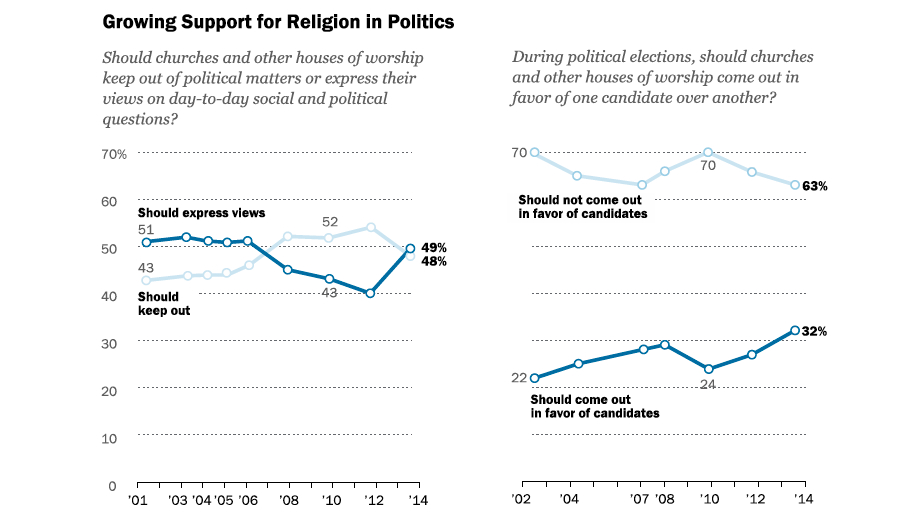More Americans want more religion in politics, according to a new Pew Research Center study exploring the "growing appetite" for churches endorsing political candidates and other intersections of church and state.
While three out of four Americans (72%, a record high) believe that religion is "losing its influence on American life," a majority of Americans (56 percent) also believe this shift has been for the worse. White evangelicals are the most likely to view the change negatively (77 percent), but the majority of white mainline Protestants (66 percent), black Protestants (65 percent), and Catholics (61 percent) feel likewise.
Gregory Smith, Pew’s director of U.S. religion surveys, previewed a number of what he called the study's "surprising" and "interesting" findings at the Religion Newswriters Association’s annual conference on Thursday.
Fewer Americans now believe churches (and other houses of worship) should stay out of politics. A narrow minority (48 percent) agree with this in 2014, versus a narrow majority (52 percent) in 2010, according to the study. About half (49 percent) also now believe that churches should express views on social and political questions, an increase from 43 percent in 2010.
While white evangelicals are most likely to support churches voicing political opinions (66 percent in 2014, versus 56 percent in 2010), support increased most among white mainline Protestants (49 percent in 2014, versus 35 percent in 2010). Support among black Protestants—two-thirds of whom are evangelicals, according to Smith—increased from 53 percent to 58 percent, widening the gap between how black and white evangelicals view the question.
While most Americans still believe churches should not have the legal right to endorse candidates, support for such pulpit endorsements has notably increased—including one-third of Americans overall, and a roughly 50-percent increase among the religiously unaffiliated, or so-called "nones." In 2010, 26 percent of the religiously affiliated and 15 percent of the “nones” said they would favor churches publicly backing candidates; in 2014, the percentages increased to 35 and 23 percent, respectively.
In the one statistic to combine evangelicals across ethnic groups, one in three evangelicals said it has become harder to be an evangelical in recent years.
On the increasingly prominent question of whether business owners opposed to same-sex marriage should be required to provide flowers, food, or photography for such weddings, Pew found that Americans are evenly split over the answer: 49 percent believe all businesses must serve same-sex weddings; 47 percent believe business owners should be allowed to follow their personal religious convictions. White evangelicals were the lone group where the majority sided with conscience of the business owner (71 percent); in contrast, a minority of white mainline Protestants (49 percent), Catholics (40 percent), and black Protestants (37 percent) agree.
Despite occupying opposite sides of this particular debate, white evangelicals (82 percent) and black Protestants (77 percent) were both more likely than other religious groups to believe homosexual behavior is sinful.
And overall, the number of Americans in agreement has actually risen slightly: 50 percent in 2014, versus 45 percent in 2010. "The change is statistically significant," said Smith. "What is harder to answer is if it is a substantively important change. It's too early to say if this is a reversal or a leveling off of current trends [in increased support of homosexuality and same-sex marriage]. That is not the conclusion I would reach yet."
Pew conducted the study of a national sample of 2,002 adults from Sept. 2-9. The margin of error for the general sample was 2.5 percentage points; among Protestant groups, it was 5.8 for white evangelicals, 6.2 for mainline Protestants, and 9 for black Protestants.
CT has covered evangelicals' favorite same-sex marriage laws, the court ruling which ignited debate on servicing same-sex weddings, asked whether Jesus would bake a cake for a same-sex wedding in Arizona (depends who you ask), and considered whether the Supreme Court will ultimately decide the national legalization of same-sex marriage.
CT also looked at a “theatrical” movement that encourages pastors to speak out on political issues and call the IRS’ “bluff.”
Past coverage of Pew Research studies includes perspectives on interfaith marriage, the morality of suicide, and global religious liberty issues.









